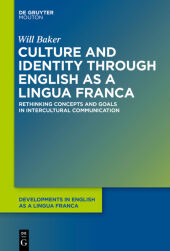 Neuerscheinungen 2015Stand: 2020-02-01 |
Schnellsuche
ISBN/Stichwort/Autor
|
Herderstraße 10
10625 Berlin
Tel.: 030 315 714 16
Fax 030 315 714 14
info@buchspektrum.de |

Will Baker
Culture and Identity through English as a Lingua Franca
Rethinking Concepts and Goals in Intercultural Communication
2015. XI, 284 S. 230 mm
Verlag/Jahr: DE GRUYTER; DE GRUYTER MOUTON 2015
ISBN: 1-501-51062-2 (1501510622)
Neue ISBN: 978-1-501-51062-5 (9781501510625)
Preis und Lieferzeit: Bitte klicken
This series welcomes book proposals detailing innovative and cutting edge research and theorisation in the field of English as a lingua franca (ELF). The purpose of the series is to offer a wide forum for work on ELF, including aspects such as descriptions and analyses of ELF; ELF use in a range of domains including education (primary, secondary and tertiary), business, tourism; conceptual works challenging current assumptions about English use and usage; works exploring the implications of ELF for English language policy, pedagogy, and practice; and ELF in relation to global multilingualism.
The use of English as a global lingua franca has given rise to new challenges and approaches in our understanding of language and communication. One area where ELF (English as a lingua franca) studies, both from an empirical and theoretical orientation, have the potential for significant developments is in our understanding of the relationships between language, culture and identity. ELF challenges traditional assumptions concerning the purposed ´inexorable´ link between a language and a culture. Due to the multitude of users and contexts of ELF communication the supposed language, culture and identity correlation, often conceived at the national level, appears simplistic and na‹ve. However, it is equally na‹ve to assume that ELF is a culturally and identity neutral form of communication. All communication involves participants, purposes, contexts and histories, none of which are ´neutral´. Thus, we need new approaches to understanding the relationship between language, culture and identity which are able to account for the multifarious and dynamic nature of ELF communication.
"In any event, the book constitutes a successful attempt to address the issue of intercultural communication in an ELF paradigm, and it will be interesting to see if the model it presents can or will be applied in other settings."Fan (Gabriel) Fang in: Journal of Multilingual and Multicultural Development 2016
Will Baker, University of Southampton, UK


